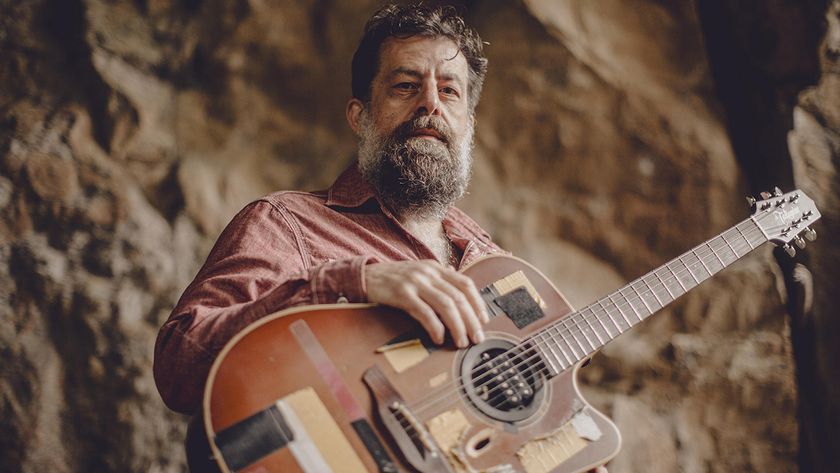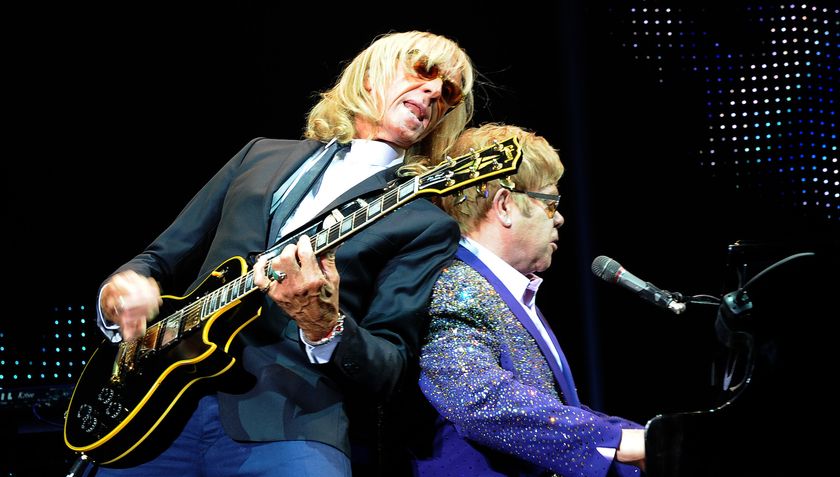Yngwie J. Malmsteen: King's Diamonds
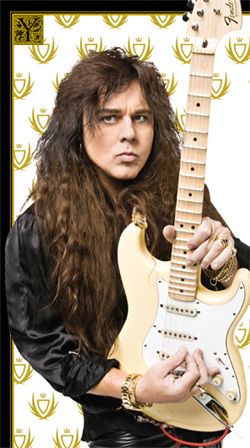
Originally printed in Guitar World, July 2008
In this album overview, Yngwie reveals the untold stories behind his crowning achievements.
Steeler [1983]“I emigrated to the U.S. on February 3, 1983, when I was 19 years old. I joined Steeler right away and recorded the album the following month. I’d been playing in bands in Sweden since the age of 11, but Steeler was my first album. I had no idea it would be released on a record label called Shrapnel. All I knew was I’d be playing in a band called Steeler.
“The album was recorded outside of San Francisco in Cotati, California, on a farm that has a recording studio called Prairie Sun Studios. Except for the guitar parts, the other instruments were recorded before I joined the band. I was anxious to record my parts, but [Shrapnel Records owner] Mike Varney told me I had to wait until he got my work papers before I could do so. My papers arrived a few weeks later, and I had to record all the guitar parts in one day! I remember Varney saying, ‘We just got your work permit. Go in there and play.’ It wasn’t really much of a toil, because I was used to working at such a hectic pace anyway. I used my 1971 ‘Duck’ Stratocaster on the album, which I played on all my albums until the early Nineties.
“Steeler was a good start for my career. They didn’t play anything dangerous—everything was formulaic—but I played all this crazy stuff on top of it, and that turned out to be an interesting combination. But by the time Steeler came out, I was already out of the band.”
Alcatrazz No Parole from Rock 'n' Roll [1983] “I joined Alcatrazz a month after I recorded Steeler. The big difference between Steeler and Alcatrazz is that in Alcatrazz I wrote the songs. When I went to the Alcatrazz audition, they had no songs and no direction. They also had a questionable drummer. They offered me the gig on the spot, but that same day I got another offer from [UFO vocalist] Phil Mogg, who wanted to get UFO going again after Michael Schenker had left to form his own band. I told Mogg I’d get back to him. I felt it would be too much of a gamble to work with him; at least Alcatrazz had a lineup and a manager.
“I told the guys in Alcatrazz I’d join if they’d get a new drummer, and they obliged. But the main thing that made me go with them was the fact that they had no songs. I wanted to write them, so that’s what I did.
Get The Pick Newsletter
All the latest guitar news, interviews, lessons, reviews, deals and more, direct to your inbox!
“Alcatrazz got to play right away, and by January 1984 we were headlining in Japan. Everything all happened at once for me—I didn’t know what was going on! I remember walking out of my hotel room in Tokyo and there’d be a throng of people waiting for me in the lobby. It was like Beatlemania! After I got back from Japan with Alcatrazz, we toured in the States with Ted Nugent, which gave us some great exposure.”
Yngwie J. Malmsteen'sRising Force [1984] “The concept behind Alcatrazz was that [vocalist] Graham Bonnet would be the star, and the band was built around him. But without intending to, I became the most popular member, which created some friction among the other guys.
“When Alcatrazz played in Japan in early ’84, the record label offered me the opportunity to do a solo album while continuing to play in the band. I wanted the whole album to have vocals, but the record company didn’t want that. Initially, the album was released solely in Japan. Months later, Polygram released it in the U.S. It spent nearly a year on the Billboard chart and was nominated for a Grammy for Best Rock Instrumental performance [in 1985].
“I began recording Rising Force with [keyboardist] Jens Johansson while I was on tour with Alcatrazz. When we had a few days off, I’d fly out to L.A. and record a couple of solos at the Record Plant and then be back in time for the next gig. A few of the songs were on the demo I sent Varney, like ‘Black Star’ and ‘Now Your Ships Are Burned.’ I don’t think Rising Force is my best album, but there are some cool tracks on it. I’ll probably play ‘Far Beyond the Sun’ and ‘Black Star’ until the day I die.”
Marching Out [1985] “Upon completing Rising Force I went straight into the studio to do Marching Out, with the intention that it would be my first U.S. solo album. But Rising Force had already beat it to the punch because it was rush-released.
“Marching Out is a pretty straightforward heavy metal album, but with insanely over-the-top guitar playing. Most of the songs were written specifically for it, except for 'Soldier without Faith’ and ‘Anguish and Fear,’ which I wrote in Sweden when I was a kid.
“A lot of the songs came together when I was living in a suburban home in L.A.’s San Fernando Valley with [drummer] Anders Johansson and his brother Jens. We set up Marshall stacks and a drum set and played in the middle of the night! As you can imagine, the neighbors weren’t happy.”
Trilogy [1986] “This album is special to me because I focused specifically on writing good songs and less on crazy guitar solos. ‘You Don’t Remember, I’ll Never Forget,’ ‘The Fury’ and ‘Magic Mirror’ are songs I’m still quite proud of. I still play ‘You Don’t Remember’ every night onstage; it’s the only tune I ever wrote on keyboards. ‘Trilogy Suite Op:5’ is a pretty out-of-control instrumental. The main riff is a fast Phrygian run that I’ve played for years. A lot of the other trademarks of my style are in that track, things like diminished, chromatic, harmonic minor and Aeolian pentatonic runs.
“Marcel Jacob played bass on Marching Out, but I played all the bass parts on Trilogy and pretty much every album since. Playing bass myself, I found out, is usually best because it’s easier to do it myself than teach my bass parts to another musician—I don’t have the patience for that. By doing it myself, I bring the guitar, bass and drums together in a more compact way. Plus, I enjoy playing bass.”
Eclipse [1990] “After coming off a very long tour for Odyssey [1988], I released Trial by Fire: Live in Leningrad [1989], an album recorded in an 18,000-seat arena long before other rock bands played in the Soviet Union. I played nine nights in Leningrad and 11 in Moscow.
“Then I moved to Miami and made Eclipse, an album which I really like. I recorded it with a fresh group of all-Swedish musicians, assembling it from songs that were lying around. Like Trilogy, it’s a song-oriented endeavor. There are some interesting songs on Eclipse, like ‘Faultline,’ which is about living near the San Andreas Fault and the earthquakes people encounter, and ‘Bedroom Eyes,’ which has a cool bluesy guitar solo. I remember saying to Fletcher, ‘We need to cut a solo for ‘Bedroom Eyes,’ but he told me we already had one. I said, ‘What do you mean?’ Unbeknownst to me, he taped me playing when I was jamming and it’s the guitar solo which appears on the song. Overall, Eclipse is fresh sounding because I was living in a new place and had a new band. It felt so good to be out of L.A. and away from earthquakes.”
The Seventh Sign [1994] “The Seventh Sign was put together quite differently than my previous records. We recorded a lot of the rhythm parts while playing to a click track rather than a drummer, and ‘Pyramid of Cheops’ was the first song I ever recorded in which I down-tuned. Although I used a Bob Bradshaw rack for Odyssey, Eclipse, and its follow-up, Fire & Ice [1992], I stopped using it on this album because I realized it’s better for onstage use— I’m more of a straight-into-the-amp guy so in the studio I just don’t need it. I just like to color my tone with a couple of Boss pedals.”
Inspiration [1996] “In the midst of an extensive tour for Magnum Opus [1995], I decided to have a state-of-the-art recording studio built in my Miami home. When I got off tour in January 1996, it was there waiting for me. I called some of my musician friends and invited them to come down and record. I named the album Inspiration because I covered songs that inspired me as a kid. ‘Pictures of Home,’ ‘Mistreated,’ ‘Demon’s Eye’ and ‘Child in Time’ have always been some of my favorite Deep Purple songs. Ritchie Blackmore was my biggest inspiration as a kid, so that’s why there are more of his songs on the album than anybody else’s. Inspiration was recorded on a two-inch-tape Studer, which at the time was the Rolex of analog mastering machines. Now it’s obsolete.”
Alchemy [1999] “After making the formulaic-sounding Facing the Animal [1997] with [deceased] drummer Cozy Powell—bless his soul!—I decided I was going to throw caution to the wind and not take the easy way out. With Alchemy, I pulled out all the stops. It features some of my sickest instrumental work! Unfortunately, I’m not entirely pleased with the sound of the record. “Everything about my style is packed onto this album. It kicks off with an insane instrumental, ‘Blitzkrieg,’ and doesn’t let up. ‘Blue’ is one of my all-time favorite instrumentals; it proves that you don’t have to play pentatonic scales to sound bluesy. There are some cool minor scales and nice wah-wah work on it. Overall, Alchemy is far more extreme than any of my previous records as far as technical craziness. The album is as over-the-top—and all the way out, and then some—as you can get.”
Concierto Suite Live with the New Japan Philharmonic Orchestra [2002] “I’m more proud of this live version of the album than the studio release [Concerto Suite for Electric Guitar and Orchestra in E Flat Minor Op. 1—1998]. Whereas the studio album was written at a leisurely pace, this album was recorded in one go with no rehearsals. After playing some dates for War to End All Wars [2000] in England, I hopped a flight to Tokyo and had to pull off this performance the following day. Not only that, but prior to my arrival the orchestra had arranged several of my earlier tracks, so I had to play their arrangements on the spot. Then they told me they’d be filming the show. Man, was I stressed, but I went onstage and nailed it! This work may be my crowning achievement.”
Unleash the Fury [2005] “The title stemmed from an incident that happened on an overseas flight to Japan with my band in 1987. We were sitting in first class, getting hammered, and doing nasty things like tossing sanitary napkins with Bloody Mary mix around. We were drunken idiots! These days, I’m as sober as a nun. After a few hours of being assholes, we fall asleep. Then [vocalist] Joe Lynn Turner and I were awakened by some lady who pours a pitcher of ice water on us. One of my band members with a weird, twisted mind decided to record the fiasco and the whole incident of me screaming at the top of my lungs appeared on the internet in 2002. I screamed at the lady, ‘You unleashed the fuckin’ fury,’ so I decided to title an album after my rant. It’s my most notorious album title, thanks to the web.”
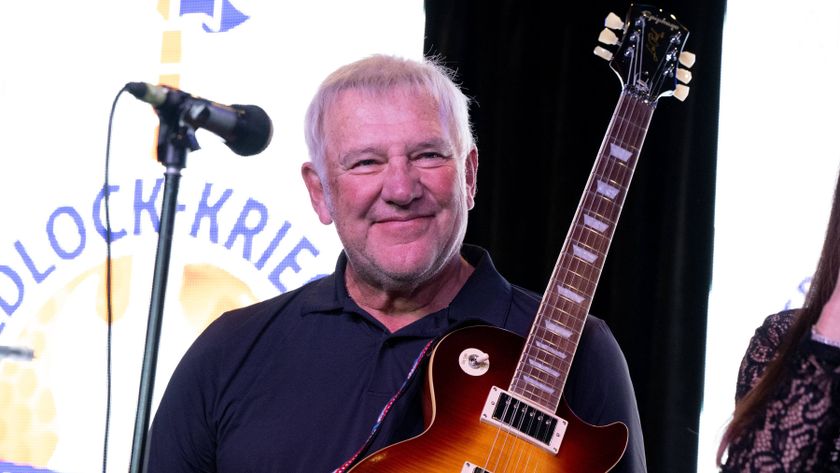
“It’s a whole new generation in sound. There’s nothing lacking”: Alex Lifeson reveals the gear that has finally converted him to digital modeling
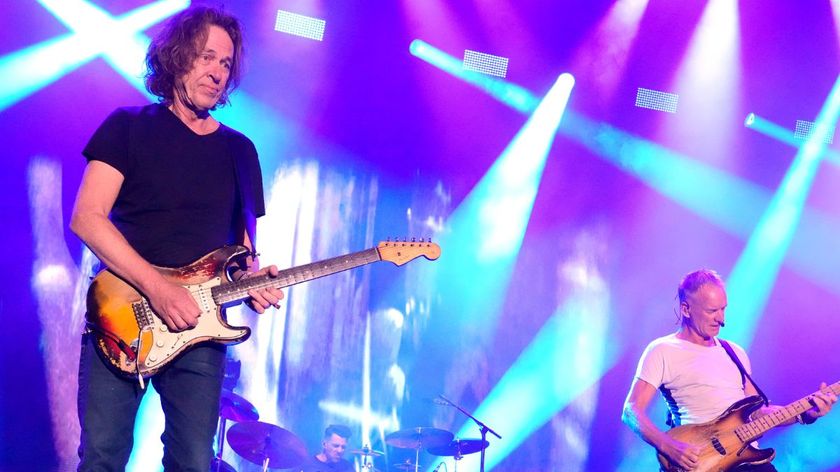
“The Strat is the most versatile electric guitar that there is; but the Les Paul is a perfect instrument”: Sting guitarist Dominic Miller weighs in on the Strat vs. Les Paul debate – says the Strat loses despite being a more versatile instrument








